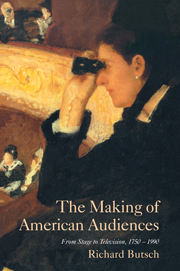Book contents
- Frontmatter
- Contents
- Acknowledgments
- Introduction: Participative Public, Passive Private?
- 1 Colonial Theater, Privileged Audiences
- 2 Drama in Early Republic Audiences
- 3 The B'Hoys in Jacksonian Theaters
- 4 Knowledge and the Decline of Audience Sovereignty
- 5 Matinee Ladies: Re-gendering Theater Audiences
- 6 Blackface, Whiteface
- 7 Variety, Liquor, and Lust
- 8 Vaudeville, Incorporated
- 9 “Legitimate” and “Illegitimate” Theater around the Turn of the Century
- 10 The Celluloid Stage: Nickelodeon Audiences
- 11 Storefronts to Theaters: Seeking the Middle Class
- 12 Voices from the Ether: Early Radio Listening
- 13 Radio Cabinets and Network Chains
- 14 Rural Radio: “We Are Seldom Lonely Anymore”
- 15 Fears and Dreams: Public Discourses about Radio
- 16 The Electronic Cyclops: Fifties Television
- 17 A TV in Every Home: Television “Effects”
- 18 Home Video: Viewer Autonomy?
- 19 Conclusion: From Effects to Resistance and Beyond
- Appendix: Availability, Affordability, Admission Price
- Notes
- Selected Bibliography
- Index
- Plate section
4 - Knowledge and the Decline of Audience Sovereignty
Published online by Cambridge University Press: 05 June 2012
- Frontmatter
- Contents
- Acknowledgments
- Introduction: Participative Public, Passive Private?
- 1 Colonial Theater, Privileged Audiences
- 2 Drama in Early Republic Audiences
- 3 The B'Hoys in Jacksonian Theaters
- 4 Knowledge and the Decline of Audience Sovereignty
- 5 Matinee Ladies: Re-gendering Theater Audiences
- 6 Blackface, Whiteface
- 7 Variety, Liquor, and Lust
- 8 Vaudeville, Incorporated
- 9 “Legitimate” and “Illegitimate” Theater around the Turn of the Century
- 10 The Celluloid Stage: Nickelodeon Audiences
- 11 Storefronts to Theaters: Seeking the Middle Class
- 12 Voices from the Ether: Early Radio Listening
- 13 Radio Cabinets and Network Chains
- 14 Rural Radio: “We Are Seldom Lonely Anymore”
- 15 Fears and Dreams: Public Discourses about Radio
- 16 The Electronic Cyclops: Fifties Television
- 17 A TV in Every Home: Television “Effects”
- 18 Home Video: Viewer Autonomy?
- 19 Conclusion: From Effects to Resistance and Beyond
- Appendix: Availability, Affordability, Admission Price
- Notes
- Selected Bibliography
- Index
- Plate section
Summary
Nineteenth–century magazines and theatrical memoirs often recounted tales of greenhorns, or “green'uns,” who reacted to events in the play as if they were real. In a story of Edwin Forrest's early career in an 1825 Albany performance of The Merchant of Venice, a canal boatman was so immersed in the characterization of Iago that he shouted “you damned lying scoundrel, I would like to get hold of you after the show and wring your infernal neck.” In another story set in 1841 Baltimore, a sailor jumped on stage to help a dying heroine, saying, “I'll be damned if a woman should starve and die,” giving her all the money in his pocket. After the scene was explained to him and he was led back to his seat, the audience gave him three cheers and ladies waved their white handkerchiefs to salute his generosity. Typically, the green'un was an unsophisticated figure, a backwoodsman, boatman or sailor, whom the rest of the audience treated with a benign condescension. Green'uns were exemplars of the common man – generous, possessing a strong sense of fairness, uncorrupted by civilization, but naive and unsophisticated in city ways.
Green'un stories offered readers an opportunity to feel knowledgeable by contrast, and thus highlighted the value placed on knowledge of the theater. The other members of the audience described in these stories also express a bemused superiority.
- Type
- Chapter
- Information
- The Making of American AudiencesFrom Stage to Television, 1750–1990, pp. 57 - 65Publisher: Cambridge University PressPrint publication year: 2000



